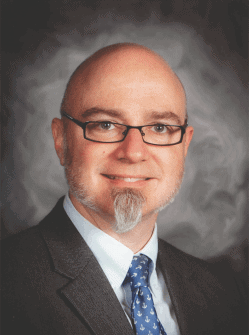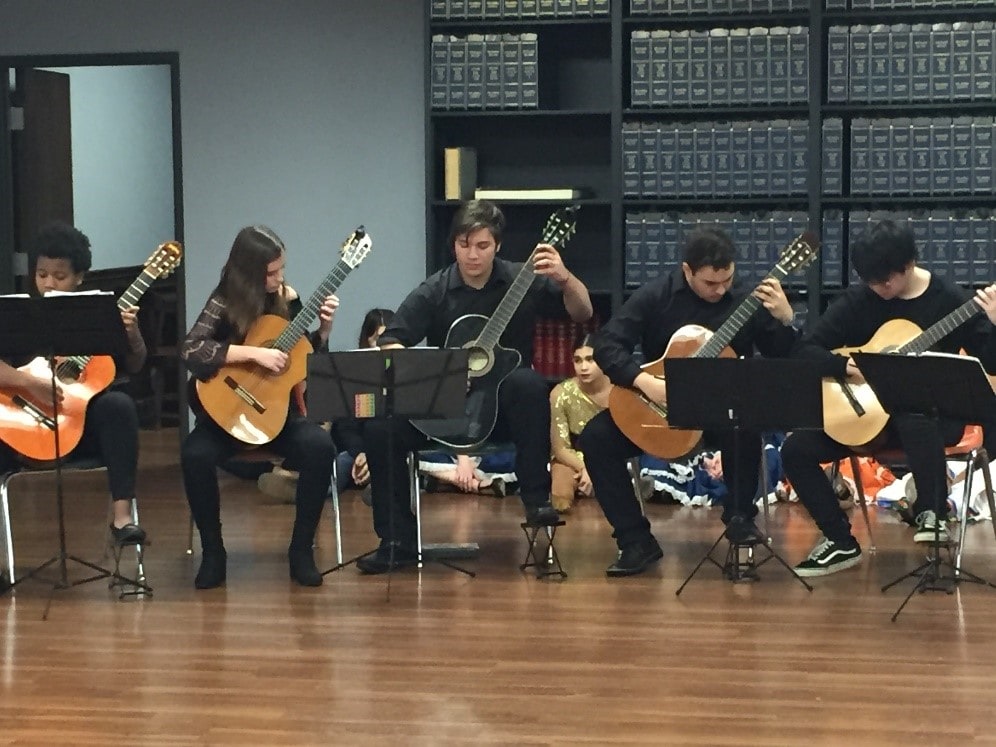/ News Posts / Guitar Class in the Sooner State
Guitar Class in the Sooner State
Number 34: The State of Oklahoma
By Thomas Amoriello, Jr.
NAfME Council for Guitar Education Chair
In this edition of “Guitar Class in 50 States,” we will not hear the  perspective of a guitar class teacher, but that of the Director of Visual and Performing Arts for the Oklahoma City Public School District (OKCPS), Rhonda Taylor. As guitar class educators, we advocate and find ways of creating unique experiences for our children, but having the support of an upper administrator in your corner can really help bring your concept to the next level. The proof is evident in OKCPS, and the NAfME Council for Guitar Education would like to thank Rhonda Taylor for sharing her knowledge in administering a city-wide guitar program.
perspective of a guitar class teacher, but that of the Director of Visual and Performing Arts for the Oklahoma City Public School District (OKCPS), Rhonda Taylor. As guitar class educators, we advocate and find ways of creating unique experiences for our children, but having the support of an upper administrator in your corner can really help bring your concept to the next level. The proof is evident in OKCPS, and the NAfME Council for Guitar Education would like to thank Rhonda Taylor for sharing her knowledge in administering a city-wide guitar program.
Please tell us about the Oklahoma City Public Schools system and about the overall music programs in the schools there.
We are a large, multicultural school district with approximately 45,000 students. We are undergoing a massive change right now, named “Pathway to Greatness.” Ultimately, these changes will provide greater equity in all areas, including arts education. We are closing 15 schools and repurposing 17 schools . . . this is an exciting and challenging time! We will now have 33 neighborhood elementary schools, 13 middle schools, nine high schools, two alternative schools, and nine charter schools. Our student body is 54 percent Hispanic, and approximately 13,000 of our students are English Language Learners. For the most part, all of our elementary sites will now be PK-4th grade, and our middle schools will be 5th-8th.
Starting this year, all of our elementary sites will have general music! Our middle and high school music programs include choir, band, orchestra, guitar, and piano. Not every program is offered at every school, but all of them will offer at least two music programs, and we are working towards a greater vertical alignment from middle through high school. We have outstanding music teachers who overcome huge challenges to provide high-level programs that are also culturally responsive. The main challenges include funding, scheduling issues, and building parent support. We are blessed to have many community arts partners in Oklahoma City.
You serve as the Director of Visual and Performing Arts. Please tell us about your own personal musical/artistic background growing up and your collegiate experience.
As a child, I was fortunate to attend an elementary school that had a full-time art and music teacher . . . I took organ lessons, dance lessons, and I was always very interested in the arts. In middle school I joined the band and began playing flute. I later attended the University of Tulsa on a music scholarship, majoring in music education. For me, arts education was truly life-changing. I often wonder where I would be if I hadn’t had those experiences as an elementary and middle school student. We often take it for granted that all of our elementary schools include arts education, but we are seeing from state department reports that arts education is often non-existent at the elementary level, at least in many the public school districts in Oklahoma. We are hoping to change that.
“For me, arts education was truly life-changing. I often wonder where I would be if I hadn’t had those experiences as an elementary and middle school student.”
Although I intended to be a band director, I ended up teaching elementary music here in Oklahoma City Public Schools. Honestly, those 11 years were the greatest of my career so far. In elementary music, you wear many hats, and every day is different—mine included choir, recorder, percussion, music and movement, dance, and even some theatre. Like any teacher, I had some challenging moments, but overall it was a blast! During that time, our school district offered a free master’s degree through the University of Central Oklahoma. I participated in the cohort, later becoming an assistant principal and then arts director.

Photo courtesy of Rhonda Taylor
What role has guitar education played within the district?
We currently have full-time guitar teachers in seven of our schools, and a few elementary sites have a guitar or ukulele program. For the most part, our administrators and community members recognize classical guitar as a core curriculum area, like band and orchestra. We still encounter situations where people just haven’t had enough personal experience with school guitar programs, so we end up needing to defend guitar education as it pertains to curriculum offerings, local and state awards, funding opportunities, etc.
I feel this is quickly changing, and guitar is seen as a mainstream program rather than an alternative or additional offering. We are seeing more guitar students as recipients for the State Superintendent Awards for Arts Excellence, for example. In our district, we have an outstanding All-City Guitar event where students practice with a clinician all day and perform that evening as a large “orchestra” of guitars. Audience members are amazed at hearing it for the first time! Even for musicians . . . it is a concept that many haven’t experienced before, but the result is that our guitar students can attain a very high level of musicality, just like we would expect from a wind ensemble, orchestra, etc. Because the playing field is leveled as compared to the time, money, and grand community efforts required for a band program (especially a large marching band program), we can create an ensemble experience that our students are extremely proud to be a part of.
What obstacles did you face in starting these programs, if any?
It is difficult to say, since I was a general music teacher when our district started the classical guitar programs. Sometimes, we still encounter the challenges mentioned above of some decision-makers seeing this as a novelty rather than a necessary core curriculum area. We are fortunate to have more and more guitar teachers in city and surrounding areas, but I assume that this might be a challenge for many districts around the state.
Some of our guitar teachers say that their OSSAA experience isn’t yet on the level that it is for band and orchestra—the judges may sometimes be giving the students all 1’s with little feedback that includes any type of constructive criticism. I assume that their contest experience will become more productive as guitar programs increase across the state.
What would you like to say to an upper administrator/performing arts supervisor who is about to or interested in incorporating the guitar into their district programs?
I would encourage them to visit our guitar classes. Listen to our practices and talk to our guitar teachers and students. I think they would be inspired to start a program ASAP.
Do you have any success stories you would like to share about what is going on in OKCPS?
Yes! In 2015, Classen SAS was one of the ensemble showcase winners at the GFA Convention, Guitar Foundation of America. I know there have been other successes. Last year, our district guitar programs performed at the state conference for the Mayors Council of Oklahoma. It was interesting to hear the comments—many didn’t realize that high school students could play on that level, and they really hadn’t thought of classical guitar as an ensemble instrument.
What kind of future do you see for guitar in music education in the Oklahoma school systems?
I would like for all of our students have the opportunity to participate in a guitar program at their school.
Any last thoughts to conclude our interview?
For districts that can’t yet offer a full-time guitar program, they might consider using Title IV funds to offer a part-time program. Last year, we utilized Title IV funds to provide a guitar program through a local arts organization. We also used Title IV funds to provide a feeder program at a middle school . . . a high school guitar teacher directed a program at the middle school level. This was a huge success, even after just one semester! He recorded a video at the end of the semester of high school students playing along with the middle school students.
Past “Guitar Class in 50 States” articles:
- Number 50: The Granite State (New Hampshire)
- Number 49: The Green Mountain State (Vermont)
- Number 48: The Mountain State (West Virginia)
- Number 47: The Hoosier State (Indiana)
- Number 46: The Mount Rushmore State (South Dakota)
- Number 45: The Pine Tree State (Maine)
- Number 44: The Badger State (Wisconsin)
- Number 43: The Constitution State (Connecticut)
- Number 42: The Evergreen State (Washington)
- Number 41: The Pelican State (Louisiana)
- Number 40: The Beaver State (Oregon)
- Number 39: The Equality State (Wyoming)
- Number 38: The Empire State (New York)
- Number 37: The Old Line State (Maryland)
- Number 36: The Centennial State (Colorado)
- Number 35: The Bay State (Massachusetts)
- Number 33: The Prairie State (Illinois)
- Number 32: The Hawkeye State (Iowa)
- Number 31: The Volunteer State (Tennessee)
- Number 30: The Palmetto State (South Carolina)
- Number 29: The Natural State (Arkansas)
- Number 28: The Tar Heel State (North Carolina)
- Number 27: The Magnolia State (Mississippi)
- Number 26: The Peace Garden State (North Dakota)
- Number 25: The Treasure State (Montana)
- Number 24: The First State (Delaware)
- Number 23: The Buckeye State (Ohio)
- Number 22: The Yellowhammer State (Alabama)
- Number 21: The Sunflower State (Kansas)
- Number 20: The Great Lakes State (Michigan)
- Number 19: The Lone Star State (Texas)
- Number 18: The Bluegrass State (Kentucky)
- Number 17: The Golden State (California)
- Number 16: The Show-Me State (Missouri)
- Number 15: The Keystone State (Pennsylvania)
- Number 14: The Last Frontier State (Alaska)
- Number 13: The Beehive State (Utah)
- Number 12: The Peach State (Georgia)
- Number 11: The Cornhusker State (Nebraska)
- Number 10: The Gem State (Idaho)
- Number 9: The Old Dominion (Virginia)
- Number 8: The Aloha State (Hawaii)
- Number 7: The Land of Enchantment (New Mexico)
- Number 6: The Sunshine State (Florida)
- Number 5: The Grand Canyon State (Arizona)
- Number 4: The Ocean State (Rhode Island)
- Number 3: The North Star State (Minnesota)
- Number 2: The Silver State (Nevada)
- Number 1: The Garden State (New Jersey)
About the author:
 Thomas Amoriello Jr. serves as the chair on the NAfME Council for Guitar Education and is also the former Chairperson for the New Jersey Music Education Association. Tom has taught guitar classes for the Flemington Raritan School District in Flemington, New Jersey, since 2005 and was also an adjunct guitar instructor at Cumberland County College, New Jersey, for five years. He has earned a Master of Music Degree in Classical Guitar Performance from Shenandoah Conservatory and a Bachelor of Arts in Music from Rowan University. He is the author of the children’s picture books A Journey to Guitarland with Maestro Armadillo and Ukulele Sam Strums in the Sand, both available from Black Rose Writing. He recently made a heavy metal recording with a stellar roster of musicians including former members of Black Sabbath, Whitesnake, Ozzy Osbourne, Yngwie J. Malmsteen’s Rising Force, and Dio that was released on H42 Records of Hamburg, Germany. The record released on 12-inch vinyl and digital platforms has received favorable reviews in many European rock magazines and appeared on the 2018 Top 15 Metal Albums list by Los Angeles KNAC Radio (Contributor Dr. Metal). Visit thomasamoriello.com for more information.
Thomas Amoriello Jr. serves as the chair on the NAfME Council for Guitar Education and is also the former Chairperson for the New Jersey Music Education Association. Tom has taught guitar classes for the Flemington Raritan School District in Flemington, New Jersey, since 2005 and was also an adjunct guitar instructor at Cumberland County College, New Jersey, for five years. He has earned a Master of Music Degree in Classical Guitar Performance from Shenandoah Conservatory and a Bachelor of Arts in Music from Rowan University. He is the author of the children’s picture books A Journey to Guitarland with Maestro Armadillo and Ukulele Sam Strums in the Sand, both available from Black Rose Writing. He recently made a heavy metal recording with a stellar roster of musicians including former members of Black Sabbath, Whitesnake, Ozzy Osbourne, Yngwie J. Malmsteen’s Rising Force, and Dio that was released on H42 Records of Hamburg, Germany. The record released on 12-inch vinyl and digital platforms has received favorable reviews in many European rock magazines and appeared on the 2018 Top 15 Metal Albums list by Los Angeles KNAC Radio (Contributor Dr. Metal). Visit thomasamoriello.com for more information.
Did this blog spur new ideas for your music program? Share them on Amplify! Interested in reprinting this article? Please review the reprint guidelines.
The National Association for Music Education (NAfME) provides a number of forums for the sharing of information and opinion, including blogs and postings on our website, articles and columns in our magazines and journals, and postings to our Amplify member portal. Unless specifically noted, the views expressed in these media do not necessarily represent the policy or views of the Association, its officers, or its employees.
Catherina Hurlburt, Marketing Communications Manager. November 14, 2019. © National Association for Music Education (NAfME.org)
Published Date
November 14, 2019
Category
- Ensembles
Copyright
November 14, 2019. © National Association for Music Education (NAfME.org)







